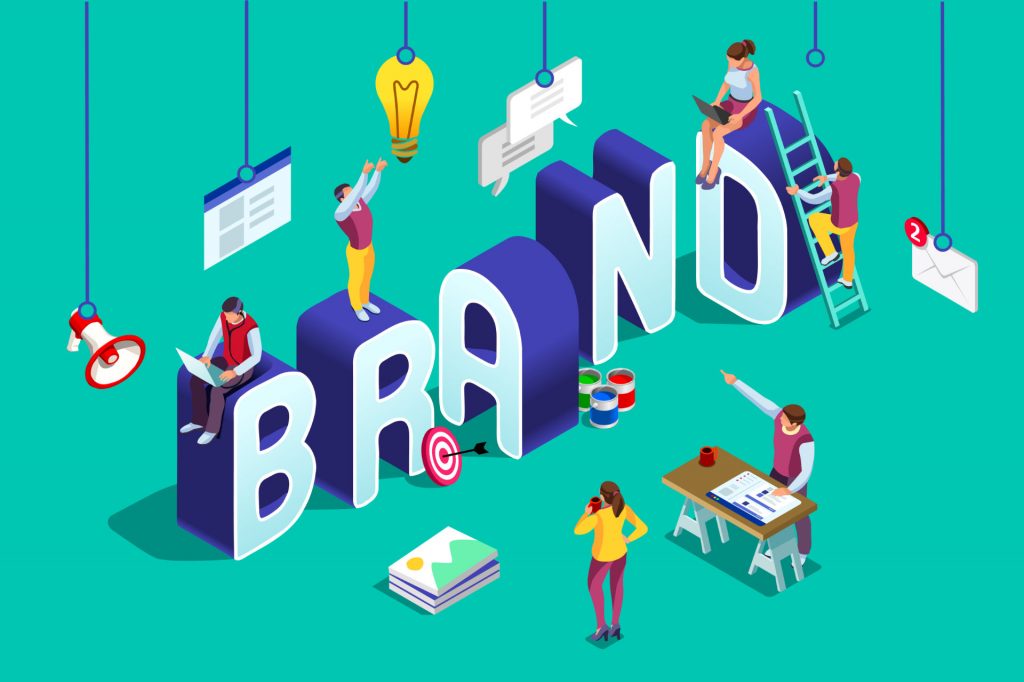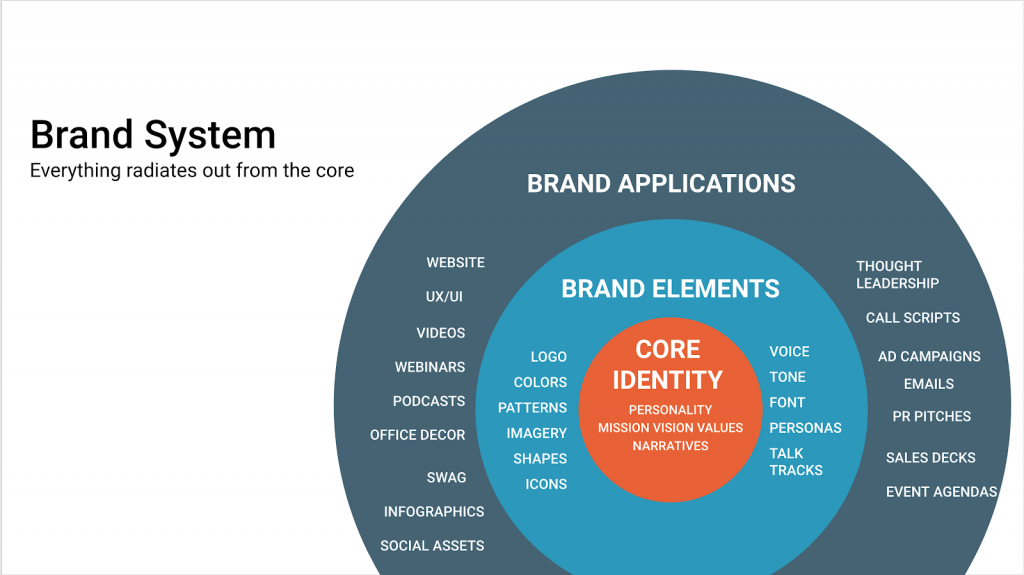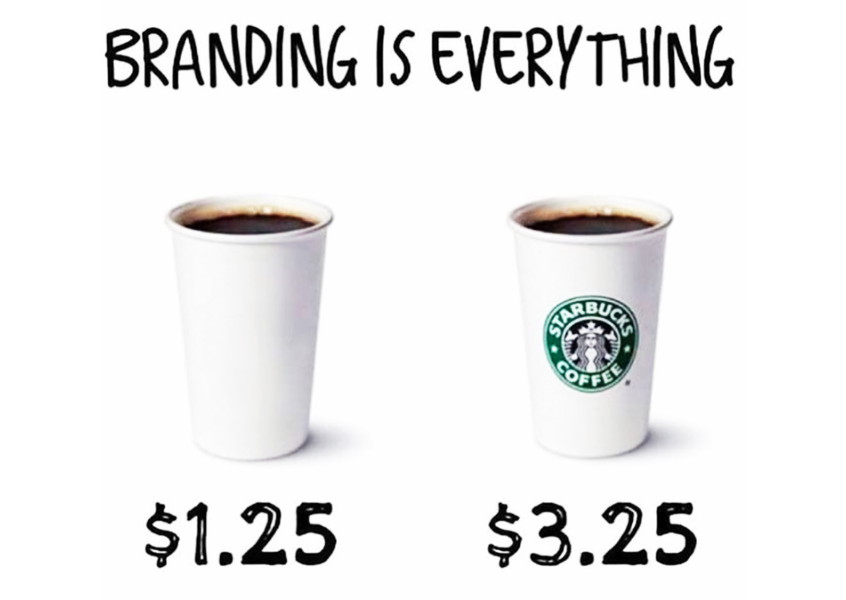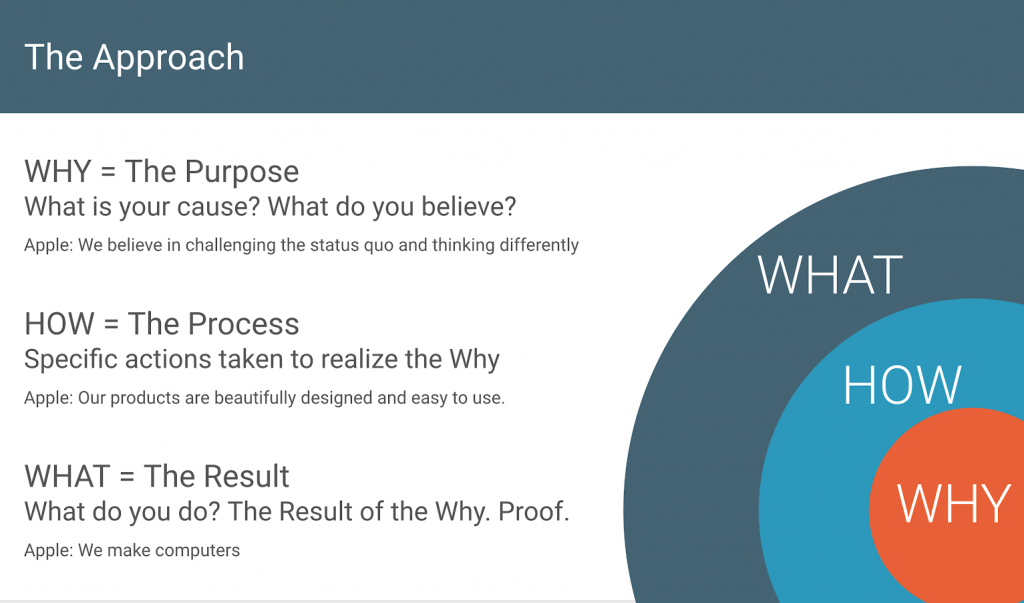To develop a brand, a business needs to focus on key areas like external communications, advertising, customer servicing, promotion, reputation management, etc., to establish itself as the go-to company for that particular product service. These elements help you build a visual brand that creates recognition in your audience’s minds.
Building a brand isn’t easy; building a strong and recognizable brand takes years or even decades. Many companies fail to create a strong brand even after being in business for a long time because they don’t understand the concept of a brand in the first place. So let’s clarify that. We will also look at how you can build a strong brand for your business.
What is a Brand?
A brand essentially represents who you are, what you do, and why you do it. A brand is your promise to the customer.

BusinessDictionary defines a brand as “Unique design, sign, symbol, words, or a combination of these, employed in creating an image that identifies a product and differentiates it from its competitors. Over time, this image becomes associated with credibility, quality, and satisfaction in the consumer’s mind”.
What is Branding?
Thus, Branding is a common marketing tactic businesses use so that customers easily recognize their symbols, logos, and other design elements. This helps a company distinguish itself from its competition and helps its audience associate its offering with its unique brand.
Elements of a Brand
A Brand has different elements that all come together harmoniously to create what we see as a brand. A handy image and a few key factors have been provided below.
- Logo
- Colors
- Patterns
- Imagery
- Shapes
- Icons
- Voice
- Tone
- Font
- Personas
- Talk tracks

Importance of Branding
Branding is extremely important for any business to succeed in this VUCA world. Some of the main reasons why branding is important are –
1. Branding Generates New Customers
A brand with a lot of buzz naturally generates more interest in customers’ minds, which becomes intrigue once they start seeing communications from your brand. An intrigued customer is certain to buy from a business that has captured the consumer’s mind space; thus, branding can help you generate new customers.
2. Branding Improves Employee Pride and Satisfaction
Humans have certain values imbibed, which they learn from their internal and external environment. People are happiest when they feel like they are a part of something bigger and are fulfilling a common purpose. Hence, a brand with strong values will make your employees feel proud of their work and satisfy them. This will also help you reduce the attrition rate.
3. Assists the Function of Advertising
Advertising is assisted very well by the portrayal of a brand. Using promotional tactics helps create a strong brand that the customers recognize. Thus, Branding helps with advertising and strategy. In the digital era, digital advertising will help you reach more customers.
4. Generates Trust in the Market
A strong and well-laid brand helps the market ease into new offerings from newer businesses. It helps generate trust in any new or potential customers’ minds, which puts them at ease when they purchase a product or service from a new or unknown business. A brand showcases industry expertise and facilitates trust in the market.
5. Branding Improves Equity
Branding is essential to increase the business’s intellectual and intangible assets. Branding improves recognition, which increases the leverage you have in the industry. This will improve your value if you wish to sell your business eventually.

What is Brand Marketing?
“Brand marketing is an approach to communications, sales, products, and services that grows the asset of brand equity,” according to Brandmarketingblog.com
A Brand is the first touchpoint, the first experience a customer has with your business, and if that experience isn’t the most pleasing, then the possibility of them moving down the funnel is fairly low. Brand marketing aims to associate your outstanding offering with an identifiable visual identity.
Let’s do a small exercise: think of the first brand that comes to mind when you read.
Cola –
Smartphone –
Motorbike –
Eyewear –
Suppose you said Coke for Coke, Apple or Samsung for smartphones, Harley Davidson for a motorbike, and Ray-Ban or Oakley for eyewear. In that case, you are highly influenced by the brands these companies have developed for themselves. This is the power of brand marketing.

The Importance of Brand Marketing
Brand marketing helps a business build trust with the help of familiarity. It assures them they know what they will get when purchasing your offering. You know exactly what you will get when you walk into a coffee store chain like Starbucks or a fast-food chain like McDonald’s. The standards put in place help the customer be at ease and help form long-term relationships with the customers.
How to Build a Brand?
1. Sit Down and Define Your Brand
The first step in building a brand is to define what your ideal brand looks like. Is your brand young and hip? Or perhaps formal and sophisticated? Maybe it’s quirky and sarcastic? That is for you to decide. Research your customers’ motivations and driving forces, and then build your brand accordingly.
2. Figure Out Your Ideal Target Audience
If you target everybody, you are targeting nobody. The biggest sin brands and businesses make when developing a stable brand strategy is not knowing who their customers are. Growth-focused and highly profitable firms know exactly what their ideal customers look like, their motivations, and what drives them to make their own decisions. So, narrow down your ideal target to develop a recognizable brand.
Some key factors to take into account to find your ideal target audience are –
- Gender
- Age
- Brand Affinity
- Influence
- Goals and Motivations
- Pain Points
- Demographics
3. Position Your Brand
Positioning the brand is extremely important. You don’t want to waste time, energy, and effort on customers who can’t afford your offering. If your positioning doesn’t clearly tell your customer what to expect from you in pricing, you will attract the wrong customer to your business.
4. Design A Recognisable Logo, Tagline, and Other Collaterals
A logo is one of the standout elements of branding. Every business needs one. Your logo should represent your brand personality and values. Some logos might indicate your business’s nature, but they don’t have to.
You can get a digital artist to design a logo for your business or use a logo maker tool like Tailor Brands. I have used them in the past. There are other ways to get cheaper collaterals, like Fiverr, but the quality is usually low and unsatisfactory.
5. Lock-In: What Is Driving Your Brand
What drives you? What drives your brand? What is the purpose of this venture? What problem have you identified and planned to solve? Answer these questions to determine your belief system and emotional positioning. This will help you with the brand marketing effort.
6. Find New Ways to Deliver the Same Message Over and Over Again
Branding is all about consistency. If you deliver different messages to your audience, then it will confuse your audience. However, if you keep repeating the same message over and over again, it will end up becoming boring. Thus, you need to figure out new ways to deliver the same message. It can be through a video, an image, a piece of content, or various new means. This will keep your message afresh and prevent it from becoming boring and stale.
7. Don’t Be A Copycat
Copycat marketing is dead. Be unique, be original, and be you. That’s the only way to succeed in the marketplace. If you try to mimic other well-established brands, you will send messages that don’t align with your vision, hamper your brand’s development. Carve out your own space in the market and see how you grow at an accelerated pace.
8. Reward Your Customer
The customer is king, and they need to be treated in the same way. By rewards, I don’t mean a tangible gift (Although that’s not a bad idea). By reward, I mean the experience they have. Provide them with the absolute best experience, and they will return again and again with more and more people. You reward them with a great experience, and they will reward you with new customers. It’s a two-way street.
9. Influence Emotions
Humans are social animals. Apart from logic, humans make decisions based on emotions. When was your last purchase, or did you do something because it felt right in your gut? That is your emotions telling you to do things. If, as a brand, you can influence your audience’s emotions, you can take them through the journey a buyer goes through and help them through the five-step decision-making process.
10. Integrate Your Brand into Every Part of the Business
The old way of stamping a logo on anything related to your business doesn’t work. You need to integrate the brand into your business in every aspect. The colors, signage, and logo (Obviously) should be integrated cohesively. Your customers are not dumb; you need not give away everything immediately. Let them be intrigued and explore more about you. This way, you will ensure a couple of return visits from them.
11. Implement, Record, and Improve
Implement the strategy, record the result, and keep improving to build your brand into a robust one. Constant improvement will help you clearly see how far you have come and keep you motivated.
By now, you should know what brand marketing is and how it helps you build a brand. Please comment if you have any more questions or confusion, and we will try to help you.
